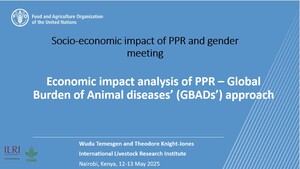
Economic impact of peste des petits ruminants on small ruminant production in Senegal: Gender considerations within a system dynamics modelling approach
Abstract
CONTEXT
Peste des petits ruminants (PPR) remains a persistent challenge for small ruminant production in Senegal, leading to economic losses for livestock keepers. Gender dynamics and socio-cultural factors influence production decisions at the household level. Despite its relevance, economic impact models of PPR have not incorporated gender dynamics.
OBJECTIVE
This paper seeks to redress this gap by disaggregating the farm-level impacts of PPR based on the gender of the household head and implementers of routine and management activities in small ruminant production at the household level.
METHODS
To quantify the gendered economic impacts of PPR, a system dynamics model was developed with four modules: integrated production-epidemiology, economics and profitability, disease control, and marketing. The model was parameterised based on survey data from 747 households in 49 agro-pastoral and pastoral villages in Senegal and augmented by secondary data. The model was validated (structurally and behaviourally) and simulated for 30 years with a weekly timestep. A set of disease scenarios were run for ten different farm household typologies based on the gender of the household head and household members who perform production management activities (like purchasing, selling, gifting, and vaccinating animals) and routine activities (like feeding, cleaning pens, and caring for sick animals).
RESULTS AND CONCLUSIONS
Model results estimated annual reductions in farm profitability of 51% to 61% with a hypothetical 25% incidence rate of PPR, corresponding to an average of $1051 to $1246 USD lost per household per year. In the two most impacted household typologies, management activities were performed by either men only or women only, and in the three least impacted household typologies, management activities were shared by men and women. The least impacted household typology with the highest gross margins without PPR ($2429 USD per year) and the lowest percentage of loss (51%) was female-headed households with men and women doing management tasks and primarily women or girls doing routine activities.
SIGNIFICANCE
Households with both women and men engaged in management activities were less impacted by PPR, highlighting the crucial role of women's agency in management decisions taken in small ruminant production at the farm level. The findings further provide the empirical grounding for considering gender dynamics in interventions to control PPR and other livestock diseases in small ruminant production systems.
Citation
Aboah, J., Campbell, Z.A., Dione, M., Kotchofa, P., Ilboudo, G., Wieland, B., Lo, M.M. and Rich, K.M. 2024. Economic impact of peste des petits ruminants on small ruminant production in Senegal: Gender considerations within a system dynamics modelling approach. Agricultural Systems 217: 103928.









